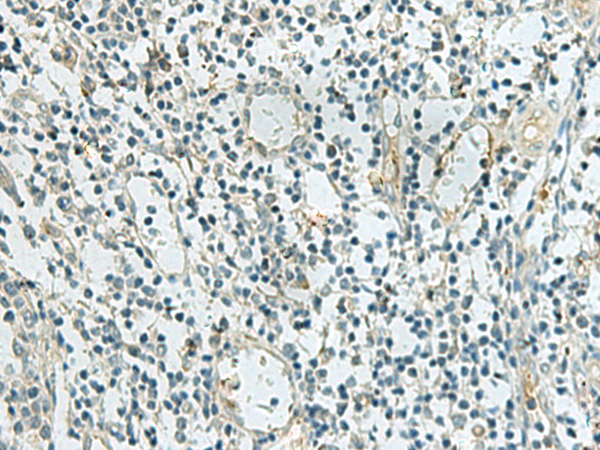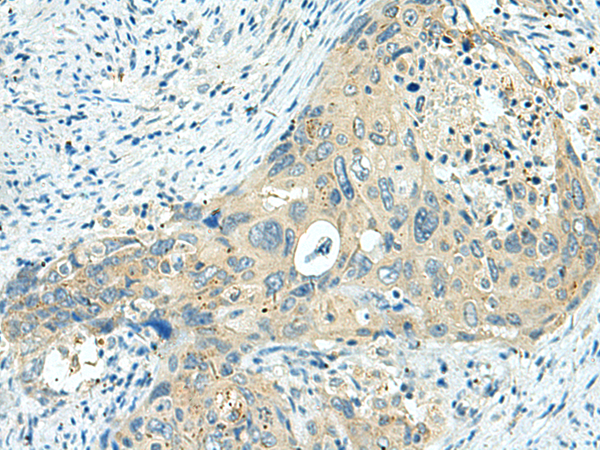

| WB | 咨询技术 | Human,Mouse,Rat |
| IF | 咨询技术 | Human,Mouse,Rat |
| IHC | 1/10-1/50 | Human,Mouse,Rat |
| ICC | 技术咨询 | Human,Mouse,Rat |
| FCM | 咨询技术 | Human,Mouse,Rat |
| Elisa | 1/5000-1/10000 | Human,Mouse,Rat |
| Aliases | RAPGAP; RAP1GA1; RAP1GAP1; RAP1GAPII |
| Host/Isotype | Rabbit IgG |
| Antibody Type | Primary antibody |
| Storage | Store at 4°C short term. Aliquot and store at -20°C long term. Avoid freeze/thaw cycles. |
| Species Reactivity | Human, Mouse |
| Immunogen | Synthetic peptide of human RAP1GAP |
| Formulation | Purified antibody in PBS with 0.05% sodium azide and 50% glycerol. |
+ +
以下是关于RAP1GAP抗体的参考文献及其摘要概括:
1. **"RAP1GAP suppresses tumor metastasis in triple-negative breast cancer"**
*作者:Li X, et al.*
摘要:研究通过Western blot和免疫组化分析RAP1GAP在乳腺癌中的表达,发现其低表达与侵袭转移相关,通过抗体验证其在抑制Ras/MAPK信号通路中的作用。
2. **"RAP1GAP inhibits pancreatic cancer cell proliferation via ERK pathway regulation"**
*作者:Wang Y, et al.*
摘要:利用RAP1GAP抗体检测胰腺癌细胞系中的蛋白表达,证实其通过负调控Rap1-ERK信号通路抑制肿瘤增殖,并影响细胞周期进展。
3. **"Loss of RAP1GAP promotes thyroid cancer progression through PI3K/AKT activation"**
*作者:Zhang H, et al.*
摘要:通过免疫荧光和Western blot结合RAP1GAP抗体,发现甲状腺癌中RAP1GAP缺失导致PI3K/AKT信号异常激活,促进肿瘤侵袭和耐药性。
4. **"RAP1GAP as a potential biomarker in colorectal cancer"**
*作者:Chen L, et al.*
摘要:研究通过免疫组化(使用RAP1GAP特异性抗体)分析结直肠癌组织,发现其表达水平与患者预后显著相关,低表达预示更差的生存率。
注:以上文献为示例,实际引用时需核对真实来源及细节。
The RAP1GAP antibody is a crucial tool for studying the RAP1 GTPase-activating protein (RAP1GAP), a key regulator of the Ras-related small GTPase RAP1. RAP1GAP accelerates the hydrolysis of GTP to GDP on RAP1. thereby inactivating its signaling. RAP1 plays diverse roles in cell adhesion, migration, proliferation, and differentiation by modulating integrin activation, MAP kinase pathways, and cytoskeletal dynamics. Dysregulation of RAP1GAP has been implicated in cancer, diabetes, and neurological disorders. In tumors, RAP1GAP often acts as a tumor suppressor; its downregulation correlates with metastasis and poor prognosis in cancers like thyroid, pancreatic, and ovarian. Conversely, elevated RAP1GAP in type 2 diabetes may impair insulin secretion by pancreatic β-cells.
RAP1GAP antibodies enable detection and localization of the protein via techniques such as Western blotting, immunohistochemistry, and immunofluorescence. These antibodies are typically raised in rabbits or mice using synthetic peptides or recombinant proteins as immunogens. Specificity is validated through knockout controls or siRNA-mediated silencing. Commercial antibodies often provide data on cross-reactivity and recommended applications. Recent studies also explore RAP1GAP’s non-canonical roles, such as interactions with the Hippo pathway, highlighting its expanding significance in cellular homeostasis and disease mechanisms. Researchers rely on high-quality RAP1GAP antibodies to dissect its complex regulatory networks and therapeutic potential.
×